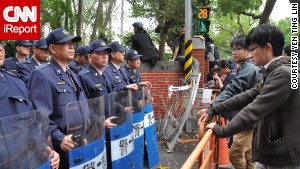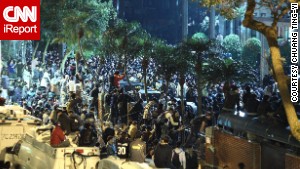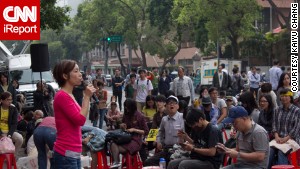Interesting that Taiwanese university students actually care about their country.
below are a few articles about the student's rising up and protesting against the Prime Minister of Taiwan simply because the parliament didnt discuss the bill sentence by sentence but just pass the bill like that...
Hundreds of students surprised the nation on Tuesday night when they broke off from an overnight sit-in and occupied the legislature in protest against the Chinese Nationalist Party (KMT) caucus’ handling of the cross-strait service trade pact.
After successfully fending off several evacuation attempts by the police and garnering national support over the past five days, the protest, which the media have dubbed the “Sunflower movement” — the largest student movement since the Wild Lily movement in 1990 that propelled legislative reform.
There are skeptics questioning almost everything about the group of young people — from their storming of the legislative compound and drinking beer in the legislative chamber, to their connections with opposition parties and their knowledge about the trade pact.
In particular, there have been many questions about the cause and sustainability of the movement.
The students have been responding to these queries on an hourly basis.
In the legislature and the rallies outside the Legislative Yuan compound, students organized into groups to clean graffiti from the walls, recycle trash and maintain order.
Set up like a well-trained army unit, the students were divided into various teams of logistics, communication, patrol and — with help from volunteer physicians and lawyers — a medical team and a legal team were quickly assembled.
That was partly because the leaders of the movement, National Taiwan University graduate student Lin Fei-fan (林飛帆) and National Tsing Hua University student Chen Wei-ting (陳為廷), as well as other members of the core leadership are seasoned veterans in social movements despite their youth.
They gained experience from numerous protests in the past two years, including the one against land seizures at Miaoli County’s Dapu Borough (大埔) and the construction of the Miramar resort in Taitung County, the campaign against media monopolization and the anti-nuclear movement.
Well aware of the nation’s political situation, the students have distanced themselves from political parties and stayed away from the so-called “blue-green struggle.”
Quite contrary to what several local media outlets and the KMT portray, most of the students in those protests have been able to explain their cause clearly and stand firmly for what they believed in.
The “Sunflower movement” is more than an overnight phenomenon and should be interpreted beyond these young people’s discontent with President Ma Ying-jeou’s (馬英九) governance.
It is the cultivation of the students’ effort in the past two years, during which they defied conventional views about the younger generation — that they could not care less about politics and the world they live in — and showed Taiwanese that they do care and they would take action to make the country a better place — any time and anywhere.
If today’s group of young activists have learned from what happened to the “Wild Lily generation,” some of them are more than likely to become the backbone of Taiwanese politics and social movements in the next 10 years.
From what people have seen so far, the new young activists show a deep caring for the nation and for the purity of politics as it was in the early 1990s.
Next article caught my attention that national uni is being supportive of the students' protesting. The director of the National Tsing-Hua University's Institute of Sociology said in a statement that all classes at the institute will be called off for one week. If the government gives the student protesters a "satisfactory response," classes will resume immediately.
http://edition.cnn.com/2014/03/24/world/asia/taiwan-trade-student-protest/index.html?sr=sharebar_facebook
Taiwan police clash with students in protests over trade deal
By Sophie Brown and Zoe Li, CNN
March 25, 2014 -- Updated 1250 GMT (2050 HKT)
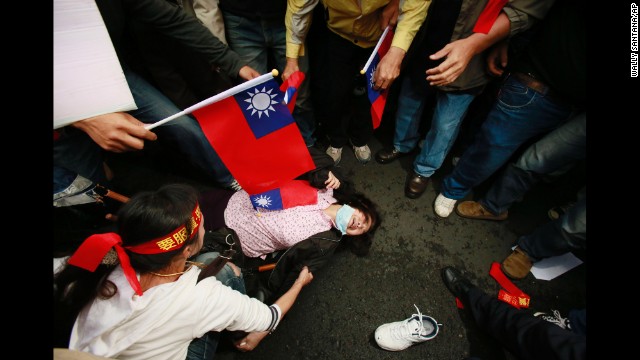 A supporter of the trade pact between China and Taiwan faints during clashes between protesters and police in Taipei, Taiwan, on Tuesday, April 1. Protesters, mostly college students, have been camped out in Taiwan's Legislature building since March 18. They say the trade deal with China could harm Taiwan's economy, democratic system and national security. But supporters of the deal have also come out to express themselves.
A supporter of the trade pact between China and Taiwan faints during clashes between protesters and police in Taipei, Taiwan, on Tuesday, April 1. Protesters, mostly college students, have been camped out in Taiwan's Legislature building since March 18. They say the trade deal with China could harm Taiwan's economy, democratic system and national security. But supporters of the deal have also come out to express themselves.
Protests in Taiwan
<<
<
1
2
3
4
5
6
7
8
9
10
11
12
13
14
15
16
17
18
19
20
21
22
23
24
>
>>
STORY HIGHLIGHTS
- Riot police disperse protesters who stormed Taiwan's executive building
- Student protesters occupying government buildings call for controversial trade deal to be scrapped
- Taiwan's president defends the pact as beneficial to the economy
- Protesters call on universities to hold strikes until demands are met
(CNN) -- Riot police evicted scores of protesters from Taiwan's executive building early Monday morning as rallies over a controversial trade deal between Taiwan and mainland China entered their seventh day.
Hundreds of protesters stormed the Executive Yuan in Taipei on Sunday evening, shortly after Taiwan's president Ma Ying-jeou dismissed protesters' demands to scrap a service trade agreement with China. Opponents of the deal say it could harm Taiwan's economy, democratic system and national security.
Police used high-pressure water cannons to disperse the demonstrators, who were mostly university students.
Students and officers face off outside the Legislative Yuan.
Meanwhile, other protesters continue their sit-in at the nearby legislature building, where they have been since March 18.
"We are tired, very tired. But we will continue on for democracy," a spokesperson for the movement, Lin Fei-fan told CNN on Monday.
"We have been protesting for seven days now. After last night's violence we are shaken," he said.
Lin estimated there were up to 200 protesters inside the Legislative Yuan's main assembly hall Monday, with more outside the building.
"Last night many students were injured and bloodied, some got concussions and bone fractures," he said.
According to Taiwan's
Central News Agency, at least 137 people, including protesters, police and journalists, have been hospitalized
since the rallies began last week. Most had minor injuries.
Taiwan's premier Jiang Yi-huah said some 61 people were arrested for breaking into the executive building, including 35 who were still being questioned as of Monday morning, CNA
reported.
Protesters gather outside Taiwain's Legislative Yuan on March 19. They are demonstrating against a trade agreement with China.
Dubbed the "Sunflower Movement" by Taiwanese media, the protesters are calling on the government to scrap a controversial trade deal which was signed in Shanghai last year.
They say the agreement will threaten small business and allow China to exert greater influence in the island through investments in "sensitive and core industries," including those associated with press freedom such as publishing and advertising.
On Sunday, Taiwan's President Ma Ying-jeou defended the pact with China -- the island's biggest trade partner -- and said that it would benefit the economy and create jobs for young people.
"Regional economic integration is an unstoppable global trend. If we do not face this and join in the process, it will only be a matter of time before we are eliminated from the competition. For the sake of the nation's development, we truly have no choice," Ma said.
Some Taiwanese believe parts of the agreement are beneficial to Taiwan's future, but many are incensed by what they believe were procedural errors in passing the pact.
"We feel that the content of the agreement was developed in 'black box' negotiations," protest leader Lin said.
"The opinions of workers were not consulted and it was passed without deliberation. This is against our democratic principles."
Taiwan and China signed the trade pact in June last year, but a review of the deal has been delayed in the legislature. On March 17, the governing party Kuomintang pushed the pact forward without bipartisan deliberation, a move that the opposition said broke an agreement that all legislators would consider the deal line by line.
"The agreement was passed without proper procedure," said Kaiyu Chang, who shot this photo of a crowd assembled in Taipei Wednesday. "That's why the people are angry," he said.
The Kuomintang has since agreed to review the pact one clause at a time during a second reading of the deal.
President Ma is taking a hard stance against the students. His government did not respond to a March 21 ultimatum by protesters to issue an apology for the deal. On Sunday, Ma appeared in public to address the protests for the first time:
"Is this the kind of democracy that we want? The foundation of democracy is rule of law -- adhering to the rule of law is fundamental to our statehood," Ma said.
The protesters have called for a students' strike across Taiwan commencing Monday. Student unions from four major universitiessaid they will participate.
The director of the National Tsing-Hua University's Institute of Sociology said in a statement that all classes at the institute will be called off for one week. If the government gives the student protesters a "satisfactory response," classes will resume immediately, he said.
According to Lin, the protest leader, at least 1,000 students were taking part in the strike as of Monday afternoon.
He said that the Taiwanese public has welcomed their campaign.
"I feel that most Taiwanese are supportive of us. They have been very warm towards us. We see parents bringing their kids to come and visit us," Lin said.
Although Taiwan governs itself as the Republic of China, with Beijing considering it a breakaway province, relations between the former rivals have improved since Ma took office in 2008.
Last month, Taiwan and mainland China held their
highest-level talks in more than six decades. The meeting marked the first government-to-government contact since their split in 1949 following the Chinese Civil War. After the talks, they agreed to open a regular communication channel, China's state media Xinhua
reported.
3rd article: this was the early cronology
Ministry of Ecudation announced its supportive attitude toward students, arguing that student participation can help reform the society
http://ireport.cnn.com/docs/DOC-1108450
Taiwan Parliament Occupied by protesters 1st time in History
By
wearytolove | Posted March 18, 2014 | Taipei City, Taiwan
For the first time in history, the Taiwan Parliament (Legislative Yuan) was occupied by protesters, who fought against a trade agreement with China.
= Live Update =
Live broadcast stream of the protest
At 20:00 3/19 Tsai Ing-wen, former DPP presidential candidate and potential candidate for next presidential election in 2016, appeared in Parliament and supported the protesters. Meanwhile, the Ministry of Ecudation announced its supportive attitude toward students, arguing that student participation can help reform the society.http://www.appledaily.com.tw/realtimenews/article/life/20140319/363090/
At 19:00 3/19 More than 40 Professors announced strikes and promoted students to "save our countries".
At 18:00 Officials and police cut off the power of the Parliament.
At 12:00 3/19 Apart from the Parliament, about 5000 citizens sat in front of theMRT Formosa Boulevard Station in Kaohsiung City, the second large city in Taiwan, to support the proest in Taipei. The Mayor of City, Kiku Chen, also came and sat with the citizens.
At 09:00 3/19 The Parliament announced suspension of meeting. The meeting was schaduled to start at 09:00, but currently the floor was still occupied by protesters.
At 06:20 3/19. The 2000 protesters oudside the Parliament started to REMOVE the police. Numerous policemen were lifted by protesters and moved out of the Parliament.
At 05:30 3/19 Police again tried to enter into the floor. Legislators are asked to leave.
At 04:47, 3/19 A policeman stripped down his uniform and shield, and then raised his two hands to show support to the protesters before returning home. Meanwhile, other police blocked the restroom.
At 04:05, 3/19 The entrance gate was broken. Two DPP legislators tried to stop the policemen from storming into the floor. http://ppt.cc/6mO3@.jpg
At 03:37, 3/19 Police tried to break the front gate. Protesters pushed the gates to resist entry. The Board of Parliament (Legislative Yuan) was abandoned in front of the building. Apart from 400 protesters in the building, more than 1000 new protesters arrived around the Parliament, supporting this occupation.
At 02:06, 3/19 More police gained entry into the main building.
At 01:20, 3/19 A policeman shared the information on online discussion board PTT that stand-by policemen in other districts were called to go to Taipei.
At 00:30, 3/19, the police asked lawyers and professors to leave the building, and they are going to arrest students.
At 00:00, 3/19, the protesters clarified their three major points:
1.Cancel the current agreement and restart negotiation.
2.The police should not enter into the Parliament, which should be owned by the public.
3.Before discussing any further agreement with China in the future, the Parliament should establish legal process for reviewing.
At 23:00, police tried to break into the building but failed.
The police announced they would definitely enter the building and arrest the protesters at 12:30.
======== Story ========
The Service Trade Agreement (服貿協議) is one of the biggest trade agreement between China and Taiwan. Since it was secretly signed in June, 2013 in Shanghai, the opposition party Democratic Progressive Party (DPP) and several civil groups requested that it be reviewed through the Parliament. On Jun 25, 2013, the ruling party KMT reached consensus with DPP to review the agreement "sentence-by-sentence." According to a survey conducted by Liberty Times, 70% of Taiwanese citizens believe that the STA should be reviewed sentence-by-sentence.
The major opposing argument against STA concerns its negative impact on national security and lower-class workers, which might be widely ignored by the KMT government. Once STA took effect, many opponents of the trade pact worried that the infrastructure including roads and online service in Taiwan could be taken over by China companies.
On this Monday (3/18), the agreement was scheduled to be scrutinized by the Internal Administration Committee. Due to a huge conflict between the two parties, the meeting did not take place. In the afternoon, the Chair of committee, KMT Legislator Chang Ching-chung, suddenly declared outside the podium that the agreement was now "passed to the Parliament for vote."
This declaration was regarded by DPP and civil groups as a violation to the Constitution as well as violating the common practice in the Parliament. Several civil groups organized protests, and more citizens were mobilized through the Internet to gather in front of the Parliament.
On Mar 18, 21:00, protesters stormed into the Parliament after hearing KMT announcing there would be no further review on the trade agreement. Protesters entered the building through all entrances, and they used chairs to prevent police entering and arresting them. Moreover, protesters broke intoChang Ching-chung's office, and found numerous business cards from Chinese companies.
or the first time in the history of Republic of China (Taiwan), protestors occupied the main building of the Parliament.
3.Other English-version news reports








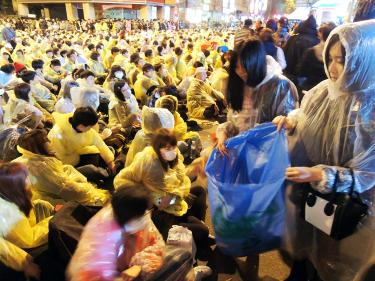
 A supporter of the trade pact between China and Taiwan faints during clashes between protesters and police in Taipei, Taiwan, on Tuesday, April 1. Protesters, mostly college students, have been camped out in Taiwan's Legislature building since March 18. They say the trade deal with China could harm Taiwan's economy, democratic system and national security. But supporters of the deal have also come out to express themselves.
A supporter of the trade pact between China and Taiwan faints during clashes between protesters and police in Taipei, Taiwan, on Tuesday, April 1. Protesters, mostly college students, have been camped out in Taiwan's Legislature building since March 18. They say the trade deal with China could harm Taiwan's economy, democratic system and national security. But supporters of the deal have also come out to express themselves.